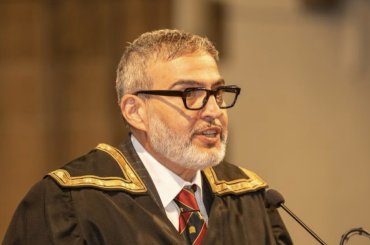The Palestinian artist, curator, and poet Ashraf Fayadh, 35, has been sentenced to death by beheading. Saudi Arabian authorities have declared his crime as “apostasy,” or abandoning one’s religion—in this case, renouncing Islam. Several other charges were also leveled against Fayadh, including allegedly photographing women and storing their pictures on his phone, a violation of the country’s Anti-Cyber Crime Law. He pleaded his innocence to all the charges. Amnesty International UK states that, “Throughout this whole process, Ashraf was denied access to a lawyer—a clear violation of international human rights law, as well as Saudi Arabia’s national laws.”
The reasons for Fayadh’s arrest and imprisonment are contested, emanating from a personal dispute with another artist which escalated into the larger accusation of apostasy and blasphemy, including by the Saudi religious police. In addition, his 2008 book of poems, Instructions Within, was cited as promulgating “atheism and destructive thoughts.”
Poets, artists, and intellectuals from the Arab world and throughout the world have been speaking out, writing articles, signing petitions, and calling for Fayadh’s acquittal. In February 2014, one hundred Arab intellectuals demanded his release from Saudi prison. The PEN American Center sent a letter to President Obama in December 2015 calling on him to press Saudi Arabia’s ruler, King Salman, to release Fayadh. Experts, however, do not expect the United States—which has close ties with Saudi Arabia—to exert any pressure on the kingdom to overturn Fayadh’s sentence. “Our only hope now is that the Saudi king will stop this madness and save Ashraf, together with the other seven people given the death penalty because of political speeches or peaceful protests,” writes a Saudi author.
Saudi Arabia’s recent executions of 47 individuals on January 2, 2016, including prominent Shi`a cleric Nimr al-Nimr, have fueled the animosity between the kingdom and the Islamic Republic of Iran. This also underlined, again, the country’s highly conservative religious worldview, intolerance of dissent, and heavy-handed methods. Many also question the United Nations’ appointment of the country to the Human Rights Council in September 2015; although the US State Department said that it welcomes the news that Saudi Arabia would actually head this council, many other countries and nongovernmental organizations were appalled.
A world-wide reading of Fayadh’s poems, sponsored by the international literature festival Berlin (ilB), is scheduled for today, January 14. The list of events grows by day, and now includes the University of Iowa’s prestigious International Writing Program. Signers of this initiative hail from many countries, including from the Middle East and North Africa, Europe, and North and South America, as well as International PEN groups. Newly translated poems have been posted to the internet for reading on January 14th.
Fayadh’s family is originally from Gaza, but he was born in Saudi Arabia and has been living and working in the southwestern Saudi city of Abha. Ironically, it was Fayadh who has played a key role in bringing Saudi art to world audiences, most notably as a member of the Saudi-British collaborative project, Edge of Arabia. In addition, the 55th Venice Biennale featured “Rhizoma,” a show curated by Fayadh and the Guggenheim Museum’s Sara Raza. “RHIZOMA’s premise draws from the actual rhizoma, the ancient Greek word for the underground root of a plant that shoots its roots both horizontally and vertically as a metaphor for a bold new generation of [Saudi] artists who are challenging the force of gravity through inspiring projects.” It is most troubling and, indeed, horrifying that the Saudi government has chosen to deal a blow to such efforts, and actually sever the roots of free speech and expression.
(Correction: This article originally stated Ashraf Fayadh’s execution was set for today. This is incorrect and the article has been updated. According to the Guardian a panel of judges will be considering an appeal in Fayadh’s case next week.)
The views expressed in this article do not necessarily reflect those of The Jerusalem Fund.



this is so horrendous it’s hard to comprehend. devastating, so young so talented, so unworthy of this gruesome sentence. just deplorable.
Saudi Arabia is a brutal f*cking place. Disgusting. >:-(
And, yet, this is the country that Zio-supremacists point to and proudly say “See? Our ‘Jewish State’ isn’t as bad as that!” Hateful and immoral morons.
Blind Western support for these thugs while their missionaries spread their poisonous Wahabi perversion of Islam around the world created ticking time bombs that are going off all around us and it is just going to get worse from here on out. The latest bomb, both literally and figuratively, went off in Jakarta just today. Western invasions and bombing campaigns didn’t help much either. The two combined are delivering a one-two punch to a civilized world.
Murderers.
Executing a person over a disagreement about religion is contrary to the teachings of the Qur’an.
“Invite (all) to the Way of thy Lord with wisdom and beautiful preaching; and argue with them in ways that are best and most gracious: for thy Lord knoweth best, who have strayed from His Path, and who receive guidance.”
The Holy Qur’an, 16:125
http://www.wright-house.com/religions/islam/Quran/16-bee.php
This ignorant, murderous King Salman is betraying the graciousness of his own Prophet.